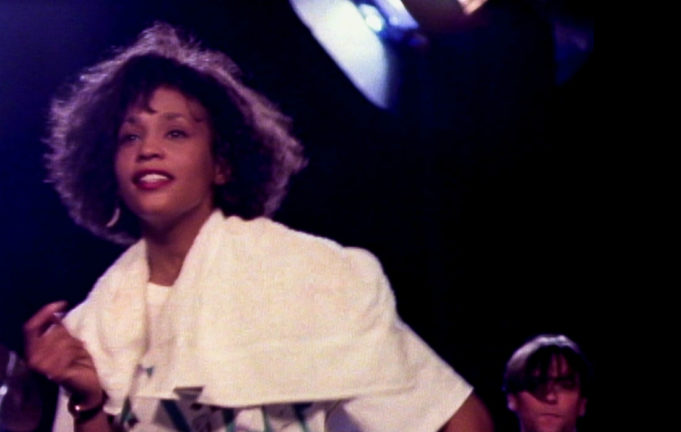Sometimes I write up obituaries of famous people on this site, and when they’ve died in unfortunate circumstances, I get angry responses. “What an idiot,” people think. “If I could throw a ball like him or sing like her, I wouldn’t screw it up like they did. I’d save up my money and never touch alcohol or drugs and avoid the wrong people and never get depressed and treat everyone well and always go to bed at 11 and live like a monk, because that kind of talent is worth it.” That’s all very easy to say, and a lot less easy to do once that talent makes you rich and famous.
Whitney Houston couldn’t manage it. She ruined a generation of singers who tried to copy her affectations without possessing her gifts or her technique, but that’s probably more on them than it is on her. In any event, she got ruined by far worse things, spending this century as a drug-addicted parody of herself. Whitney, the new documentary sanctioned by her family estate, reminds us what kind of force she was in her day, and how much it cost her personally.
The film traces her life back to her middle-class childhood in New Jersey, where she was drilled ruthlessly in vocal technique by her Motown singer mother Cissy Houston, while her political kingmaker father John managed her career. Whitney, known as “Nippy” to her family members for her penchant for getting into trouble, grew up in a family that went to church every Sunday while John cheated relentlessly on Cissy and left a trail of illegitimate children. Despite this, he was violently possessive when Cissy did some retaliatory cheating. Drugs ran through the house as strongly as denial, and an uncle interviewed here describes how he gave Whitney a bag of weed and a hit of cocaine for her 16th birthday.
To this was added the pressures of a high-profile entertainment career, prodded by her gorgeous looks and that elemental voice, capable equally of the seductive tease of “Saving All My Love for You” or the blast-you-out-of-the-room power of “I Will Always Love You.” At a time when black America needed a princess in the larger pop culture, her talents uniquely equipped her for the role.
Temperamentally, though, it was a different story. She needed to be sexy but also wholesome, she couldn’t go public about her attractions to other women, she couldn’t have anything less than a perfect family life (which is why John and Cissy kept up the facade of a happy marriage for years after they divorced). While a white artist like Madonna was free to flaunt her sexuality, Whitney got kept in her box by her family as much as her audience. And we haven’t even got to Bobby Brown, her toxic, codependent husband who couldn’t cope with her career outstripping his.
British director Kevin Macdonald has directed fiction films (like The Last King of Scotland and State of Play), but his documentaries (like Touching the Void and Marley) have been consistently better. The Houstons’ seal of approval allows him to interview many people in Whitney’s life, he talks to a maddening parade of people disowning any responsibility for her welfare: Brown, who refuses to discuss their drug use, saying “it wasn’t part of her life”; her record label president L.A. Reid, who claims complete ignorance of any addictions; her family members, who call her bisexuality “wicked” and “evil.” Set against these are interviews with her co-star from The Bodyguard, Kevin Costner, who sums up the historic nature of that cheesy film as succinctly as any movie critic could, and Mary Jones, the longtime personal assistant who followed Whitney’s request to buy cupcakes with sprinkles and came back to her hotel room to find her dead.
If these are to form the portrait of Whitney Houston, then it has a gaping hole: Cissy Houston, who shows up near the start to say a few words about her hardscrabble life and then disappears. (Though we do see her in footage from the ‘90s, telling her daughter, “Never mind that Janet Jackson shit! Let the bitch have it! You got class, you can sing, you don’t need it.”) What does she make of the wreckage that her daughter’s life eventually became? Or the fact that Whitney told people that she had been molested as a child by Cissy’s sister, Dee Dee Warwick (an assertion backed up by two of Houston’s half-brothers, who say they were molested as well)? The silence on this count is deafening. Macdonald’s access to the family proves to be a double-edged sword in this regard.
We don’t get much about the craftsmanship that went into Houston’s music-making, at least not from her. (Her fellow musicians do break down her galvanizing performance of the national anthem before Super Bowl XXV.) Emerging from a childhood swimming in lies, she built up so many layers of artifice to her public persona that she couldn’t do much introspection. The only time she ever got pinned down was by Diane Sawyer in the infamous 2001 “crack is wack” interview, from which Houston’s reputation never recovered. After getting her to admit to her drug use for the first time, Sawyer asked which of them was the biggest devil, and an acutely uncomfortable-looking Houston responded, “That would be me.” That much is true, but she had plenty of help, as this terribly sad documentary makes clear.
Whitney
Starring Whitney Houston. Directed by Kevin Macdonald. Rated R.












